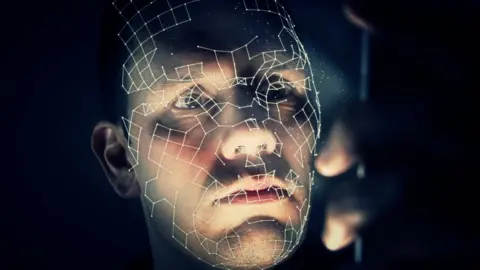Facial recognition tech: Liberty 'police racism' claim
 Spencer Whalen / EyeEm
Spencer Whalen / EyeEmCivil rights groups have claimed facial recognition technology will make racism within the police worse.
South Wales Police is set to restart using the controversial technology after an independent review said it was not discriminatory.
But Liberty said history showed it would "always be used disproportionately against communities of colour".
The force insisted the technology would be used responsibly.
Live facial recognition enables police to find people at big events suspected of committing crimes.
In 2020, appeal court judges ruled a trial project to scan thousands of faces by South Wales Police was unlawful.
The force had paused its use of the technology amid concerns over discrimination, but will resume in the wake of a report commissioned in conjunction with the Metropolitan Police.
It found there were minimal discrepancies for race and sex when the technology is used at certain settings.
 South Wales Police
South Wales PoliceLiberty, which describes itself as "the UK's largest civil liberties organisation," said the technology was oppressive and had no place in a democracy.
"Our ability to express ideas, communicate with others and engage in democratic processes will be undermined by technology such as facial recognition," said campaigns manager Emmanuelle Andrews.
"The expansion of mass surveillance tools has no place on the streets of a rights respecting democracy."
'Proper list with careful thought'
South Wales Police chief constable Jeremy Vaughan said the study confirmed the software does not discriminate.
"We're not going to just stick cameras out and look for whoever we want to at any given point in time," he said.
"There's a proper list with careful thought about who's on that list."
But following a damning report about the Met and concerns about racism, misogyny and homophobia within Gwent Police, campaign groups said they have every right to be concerned.
"Facial recognition doesn't make people safer," Mr Andrews said.
"It entrenches patterns of discrimination and sows division.
"History tells us that surveillance technology will always be used disproportionately against communities of colour and those most marginalised in our society and at a time when racism in UK policing has rightly been highlighted.
"It's simply unjustifiable to use a technology that will make this even worse."

Race Council Cymru's Molara Awen pointed to incidents where the technology has had "difficulty identifying black faces".
She said the decision had been made without the organisation being consulted.
"We know that the justice system does not work equally for black people as it does for white people," she added.
"We're all of a sudden supposed to just trust them? And it's all fine?"
South Wales Police said it remained committed to the careful development and deployment of facial recognition and that it was proud there had never been an unlawful arrest as a result of using the software.
